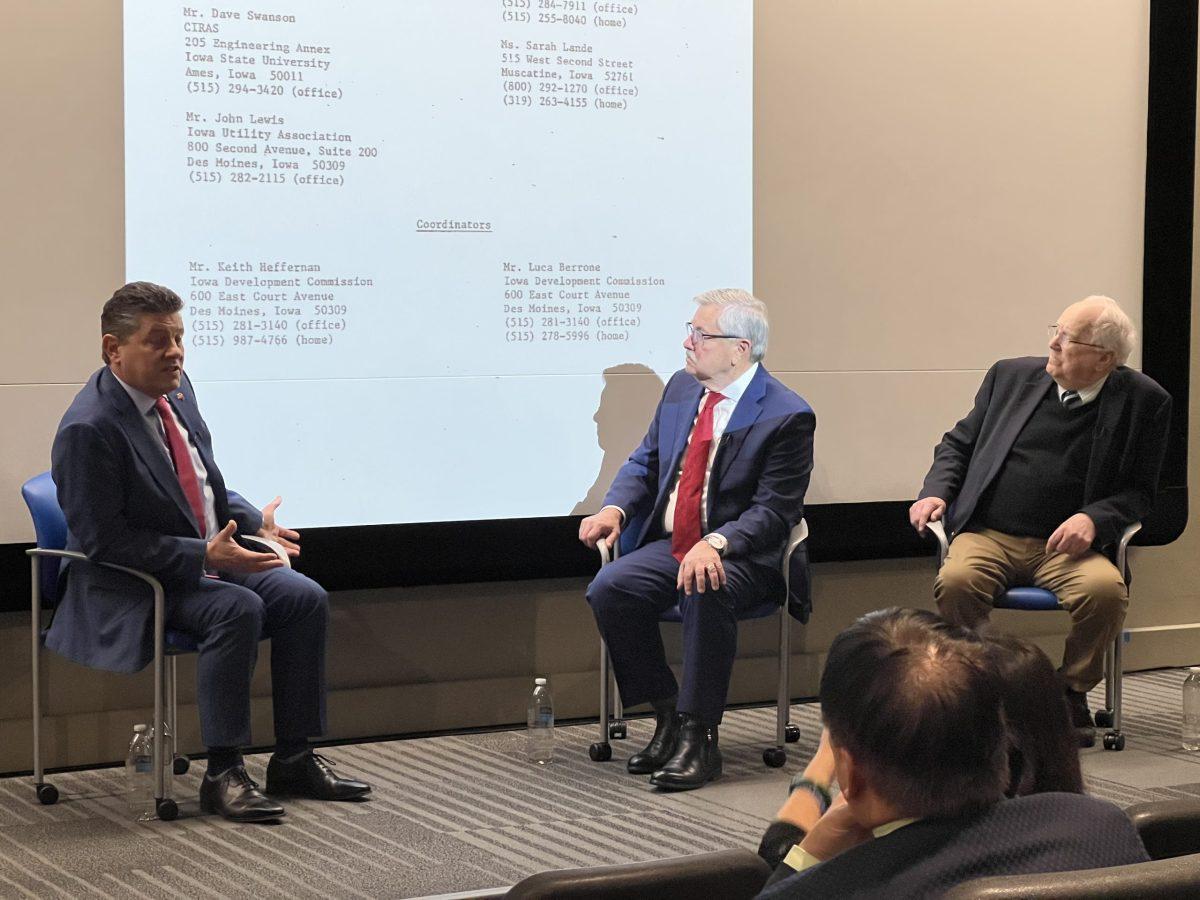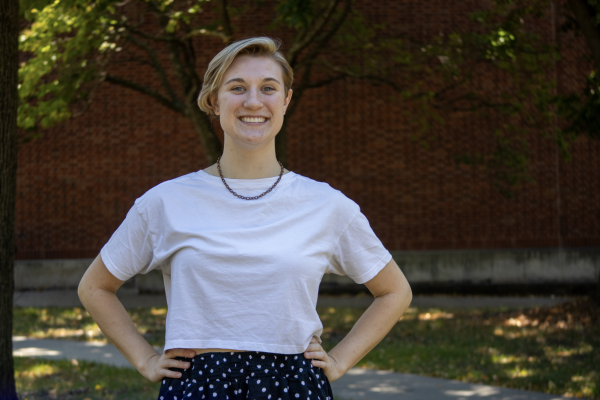On Thursday, Nov. 17, Drake hosted Chinese scholars, professors, and advocates, as well as former U.S. ambassadors to China, during a day of discussions centered on U.S.-China relations.
Topics spanned the Iowa-China Sister States Program, the possibility of a Cold War between the increasingly competitive nations and U.S.-China educational exchanges. Author and journalist John Pomfret delivered the day’s featured conversation, which primarily took the form of an audience Q&A.
The day opened with remarks from Drake President Marty Martin and a video message from Consul General Zhao Jian of the People’s Republic of China. Zhao spoke on the “Taiwan question” as well as his desire for the U.S. and China to “prosper together.”
“What we hope to see is peace and stability across the Taiwan Strait, and we will continue to strive for peaceful reunification,” Zhao said. He said he hoped the U.S. would continue to support the ‘One China’ principle, which states that Taiwan is a part of China.
Following the remarks was a panel titled “U.S.-China Education Exchange: Past, Present, Future” featuring Raven Witherspoon – a recent graduate of the Schwarzman Scholars program that allows post-graduate students to study at Tsinghua University in China, Senior Adviser of the Carter Center Yawei Liu; and facilitators of international studies from multiple American universities. They emphasized the role of educational exchanges in fostering positive U.S.-China relations.
According to the University of Missouri-St. Louis’s former Director for the Center for International Studies, Joel Glassman, the Chinese government halted educational exchanges a year after they began, but UMSL and Nanjing Normal University established two programs despite multiple bureaucratic obstacles. The COVID-19 pandemic ultimately shut both programs down.
Next, Harkin Institute Disability Policy Director Daniel Van Sant moderated a panel on “Disability Rights and Inclusive Education in China,” featuring St. Cloud State University research scholar Zhou Xiaorong and Chinese disability rights self-advocate Renci Xie.
Those registered for a full day of sessions then received a complimentary lunch. A private book club discussing Pomfret’s book, “The Beautiful Country and the Middle Kingdom: America and China, 1776 to the Present,” also took place during the lunch hour. Multiple Drake students were in attendance. Participants asked Pomfret whether he believed the U.S. and China would continue to display the cyclical positive-negative relationship pattern he describes in his book, America’s historical missionary activity in China and why the country of nearly 1.5 billion people has not invested more in public health.
“I think the U.S. as a model for modernizing China was very powerful – both as a negative example and a positive example. In this country, we have our own challenges of creating a good public health system, so it’s not something that’s the sole possession of China,” Pomfret said. “But I think in looking at how the (Chinese Communist) Party has dealt with COVID, it’s illustrated in some ways that there’s a tacit acknowledgment that their public health system is not up to snuff, so their response is to shut the place down. I think the whole desire to be modern and to be a leading modern nation is something that is very deep.”
Some participants expressed their belief that the U.S.-China relationship will enter more positive territory, while others asserted that China’s rivaling position on the world stage will disrupt the historical ‘cycles’ of the U.S.-China relationship. Pomfret asserted that “America has never really had to deal with China as a powerful nation.”
The private book club preceded the public conversation with Pomfret, during which audience members inquired about the ambitions of the People’s Republic of China, the impacts of U.S.-China tensions on other pacific rim countries, U.S. policy towards China and the deterioration of the U.S.-China relationship.
“The question is do the Chinese – does the PRC – have an idea and a desire to surpass the United States in terms of its national power?” Pomfret said. “I think there’s always been a significant part of the Chinese Communist Party who has believed that idea…I think today. Those people are in charge of China. So I think China’s goal now is very much to surpass.”
“In the past, American business really was the balance of the relationship, and rightly so, because relationships were so sort of profitable for both sides,” Pomfret said. “But a significant number of American companies..feel like they’ve been burdened in China, so they can no longer act as the balance like they used to.”
The day continued with an “Armchair Discussion with former U.S. Ambassador to China Terry Branstad and his former Deputy Chief of Mission Jonathan Fritz,” moderated by former Chief of Staff at the U.S. Embassy in Beijing Steve Churchill. Branstad and Fritz discussed their work gathering information on North Korean nuclear tests, convincing the Chinese government to schedule fentanyl, attempting to level the playing field for U.S. businesses in China and cooperation on threats like climate change and COVID.
“As we form ever broader coalitions of like-minded partners, we intend to compete hard and make sure that our vision of the international order is going to prevail,” Fritz said. “By that, I mean respect for national sovereignty of all countries, respect for fundamental human rights enshrined in the UN Charter and other foundational documents of the United Nations, level playing field for commerce, organized trade and investment, and so on and so forth.”
Next was a panel discussion between former U.S. Ambassador Kenneth Quinn, Branstad and citizen diplomat Luca Berrone covering the legacy of Xi Jinping’s visit to Iowa in 1985, moderated by Executive Director of Iowa Sister States Kim Heidemann.
“There’s a moment here where China and the United States have an opportunity to have a different relationship going forward based on the experience that this man who’s likely going to be the president of China had in our country,” Berrone said of Xi’s visit. However, he said this statement does not hold true today.
The day closed with a panel moderated by Drake’s own David Skidmore, a political science professor who specializes in U.S.-China relations. The panel focused on whether a Cold War between the U.S. and China was possible and featured Yun Sun, senior fellow and Co-Director of the East Asia Program and Director of the China Program at the Stimson Center, and John M. Owen, Ph.D., a professor of politics at the University of Virginia and Faculty Fellow at the Institute for Advanced Studies in Culture.
“I hesitate to say, ‘Oh, the U.S.-China situation is just a bipolar system, so it’s like Athens and Sparta or it’s like the Soviet Union and the United States in the Cold War,” Owen said. “It’s more complicated than that. [The] U.S. and China are highly interdependent, and, as I’ve mentioned, meeting the economy of one depends in great part on the economy of the other.”








